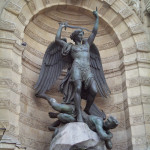We run our website the way we wished the whole internet worked: we provide high quality original content with no ads. We are funded solely by your direct support. Please consider supporting this project.

Knowing the Eternal God
If all our knowledge about God is to be oriented around the cross, as I argue in many places (see this post for instance), what does this mean for how we reflect on God’s transcendence? In other words, how can we speak of God’s eternal being since there obviously was no cross within God prior to, and apart from, the fallen world?
To begin, let me say that I cannot throw my hat in the ring with that radically temporalistic strand of contemporary theology that virtually does away with any distinction between God’s eternal being and his revelation in Christ. In technical terms, they eliminate the distinction between ad intra (his eternal being) and ad extra (his revelation). Hence, for example, Eberhard Jüngel and Jürgen Moltmann define God as “the event” in which he reveals himself in Jesus Christ.
By contrast, I affirm the ad intra/ad extra distinction. But I also fully embrace Karl Rahner’s teaching that, if the way God is toward us in Christ truly reveals God, then there must be, at the very least, a strong analogical correspondence between God’s immanent eternal being and his economic revelation in Christ. But this correspondence allows me to affirm contingent aspects of his revelation toward us —aspects such as his becoming-human and his becoming-sin—that we must consider to be absent in the way God exists within his threefold self prior to and apart from creation.
While a great deal could be said about this matter, the point I want to make about his eternal being ad intra concerns the character of his threefold identity. That is, while there is obviously no Incarnation or Crucifixion within the immanent Trinity prior to creation, we must affirm that the infinitely intense love of God that is expressed when God stooped an infinite distance to become our sin and our curse on Calvary expresses the unsurpassable intensity of the unwavering perfect love that the three divine Persons have for each other throughout eternity.
Moreover, inasmuch as the Church as the bride of Christ is a contingent expression of the Father’s perfect love for the Son that is mediated by the Spirit, and inasmuch as the bride, abiding in the Son, shares in the Son’s reception of the Father’s perfect love and participates in the Son’s perfect love for the Father mediated through the Spirit, we must go further and add that God’s revelation to us expresses, and even participates in, the perfect eternal love that unites the triune fellowship throughout eternity.
The best expression in Church history of the infinitely intense triune love that is revealed on the cross and that characterizes God ad intra, in my estimation, is found in the concept of the perichoresis of the three Persons. In essence, this concept stipulates that the other-oriented love of the three divine Persons is such that throughout eternity they have completely given themselves over to one another and thus fully dwell within one another. This is the infinitely intense, triune, mutually-indwelling love that is incarnated and revealed in Christ and that the Church is graciously made a participant of.
Photo credit: kafoster27 via Visualhunt / CC BY-ND
Category: General
Tags: Cross, God's Character, Perichoresis, Trinity
Related Reading

The Trinity and the Crucified God
God has always been willing to stoop to accommodate the fallen state of his covenant people in order to remain in a transforming relationship with them and in order to continue to further his sovereign purposes through them. This is revealed in the life and death of Jesus. Out of love for humankind, Jesus emptied…

The Future of Theology
Chris Moore via Compfight Roger Olson recently published a blog arguing that there really are no new ideas out there in the realm of theology. Everything has pretty much been thought of or proposed. That idea or book that’s causing such a stir? Rewarmed material that someone else already thought of. So what is there…

The Cleansing of the Temple and Non-Violence
Jesus’ cleansing of the Temple is the most commonly cited example of those who allege that he did not absolutize loving enemies or refraining from violence. I submit that this episode implies nothing of the sort. First, it is important that we understand that this episode was not an expression of unpremeditated anger on Jesus’…

The Most Quoted Old Testament Verse
No other passage from the Old Testament is quoted more by New Testament authors than Psalm 110:1. Its frequent citation should cause us to pay attention to what is being said. It reads: The Lord says to my lord, “Sit at my right hand until I make your enemies your footstool.” In David’s day, it…

When God Abandoned God
On the cross, Jesus’ cried out, “Eli, Eli, lema sabachthani?” – which means, “My God, my God, why have you forsaken me? (Mt. 27:46). These are arguably the most shocking, beautiful, and profoundly revelatory words found in Scripture. The cry reveals that on Calvary, the all-holy Son of God experienced God-forsakenness as he bore the…

Violent Parables?
Some try to argue that Jesus did not make loving enemies and refraining from violence an absolute mandate. They make their case on the basis of several passages from the Gospels. The first concerns the cleansing of the temple which we addressed here, while the second is about how Jesus spoke harsh words to the…
